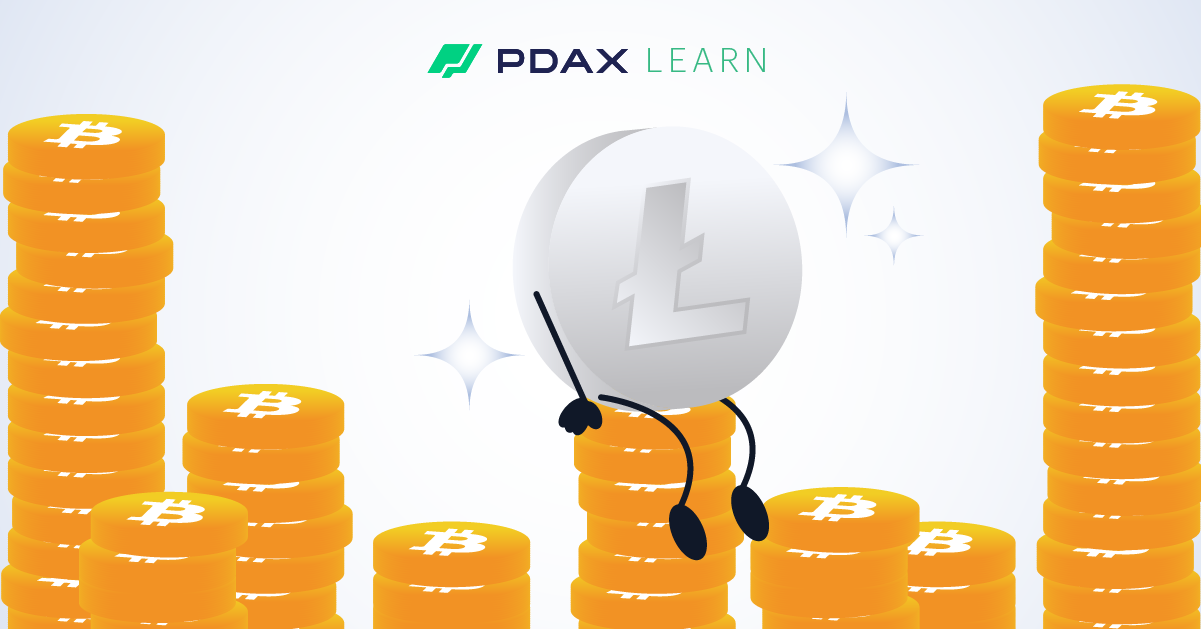Being the very first cryptocurrency, Bitcoin (BTC) naturally garnered the reputation for being the “gold standard” for digital currencies. Meanwhile, the very first altcoin to ever be issued–Litecoin (LTC)–quickly became known as “the silver to Bitcoin’s gold” when it was launched in 2011.
As the nicknames suggest, Litecoin is less valuable than Bitcoin–but this was because Litecoin was designed with specific improvements that gave it more utility than Bitcoin. Despite the initial intentions outlined in Bitcoin’s whitepaper, BTC had become more of a store of value rather than a digital currency that people wanted to spend. Litecoin sought to address this by improving transaction speeds and charging lower fees.
Another issue that Litecoin wanted to address was the rise of large Bitcoin “mining operations” that smaller miners simply couldn’t compete with. When in the early days of Bitcoin, mining could be done with one’s personal computer, the huge demand and stiff competition soon led to miners resorting to warehouses filled with heavy-duty graphics processing units (GPUs) and application-specific integrated circuit (ASIC) processors that effectively put the home miner out of business.
This also meant that Bitcoin was becoming less decentralized and more exclusive for only those who could afford the hardware. Thus, a “lighter” cryptocurrency was needed to encourage more users to participate in building a cryptocurrency network.
How does Litecoin compare with Bitcoin?
Litecoin adopted Bitcoin’s original code, though it started its own genesis block (the first block in a blockchain) instead of branching off or “forking” from Bitcoin’s ledger (as is the case for example with Bitcoin Cash). Thus Bitcoin and Litecoin share many similarities such as both using Proof-of-Work (PoW) consensus protocols, though there are a number of key differences when it comes to processing transactions.
First, Litecoin improved on Bitcoin’s block time–or the rate by which new blocks are added to the network’s ledger, which translates to how fast the network is able to validate transactions. Instead of the conventional 10-minute block time with BTC, Litecoin made it four times faster at 2.5 minutes per block. This also means that Litecoin is able to process more transactions per second (TPS)–at around 56 TPS compared to Bitcoin’s 7 TPS.
Litecoin also increased Bitcoin’s maximum supply by four times, at 84 million tokens compared to BTC’s 21 million. But since Litecoin produces blocks four times faster than Bitcoin, this means that Litecoin’s halving process is roughly in sync with Bitcoin which happens roughly every four years.
As Litecoin is similar to Bitcoin in code, many of the updates to the Bitcoin network were first tested on Litecoin, including Bitcoin’s Lightning Network. Recently, Litecoin underwent its MimbleWimble upgrade (named after the Harry Potter tongue-tying spell) which was designed to greatly improve its privacy and scalability capabilities.
What can you do with LTC?
Litecoin is mostly used as currency for the exchange of goods and services, mostly with online merchants and is relatively more accepted than Bitcoin as it is cheaper and charges less transaction fees. The Cryptwerk directory lists more than 3000 merchants worldwide who accept LItecoin as payment. On average, Litecoin only charges around $0.3 to $0.4 per transaction, making it ideal for micro-purchases and remittances.
Tokenomics
Litecoin’s current circulating supply is at 70 million out of a maximum supply of 84 million. As of July of 2022, the current block reward is at 12.5 LTC every block, which means that every day 7,200 new LTC coins are minted. The next halving event is not due to take place within another year, and the supply of Litecoin will only be fully diluted by year 2142.
Ready to start with crypto?
Start your trading journey with PDAX.
DISCLAIMER: The statements in this article do not constitute financial advice. PDAX does not guarantee the technical and financial integrity of the digital asset and its ecosystem. Any and all trading involving the digital asset is subject to the user’s risk and discretion and must be done after adequate and in-depth research and analysis.
About PDAX
PDAX is a BSP-licensed exchange where you can trade Bitcoin, Ethereum, and other cryptocurrencies directly using PHP!
Featured Posts
You might also like
USA₮ (USAT) is now on PDAX!
PDAX
February 19, 2026
SUI is now on PDAX!
PDAX
January 28, 2026
MON (Monad) is now on PDAX!
PDAX
December 04, 2025
PDAX Learn: USDC on Arbitrum is now on PDAX
PDAX
December 01, 2025
